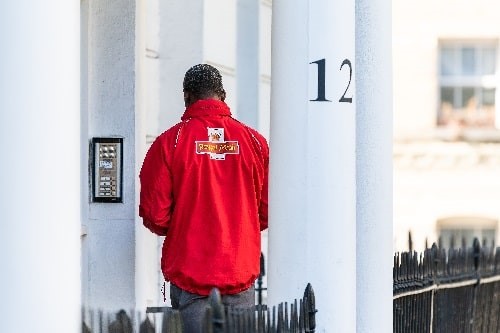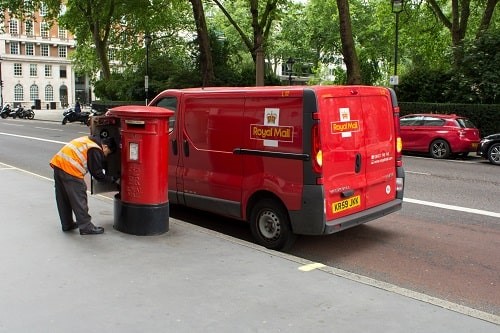“Health First – Protect our People, Protect our Country, Protect our Company.”
Features
Case study: The Royal Mail response to the coronavirus
Our message is simple, explains Dr Shaun Davis, global director of compliance and sustainability at Royal Mail Group, who is a key player in the team that is working to develop a cohesive approach to supporting the business and its workforce through the current coronavirus pandemic: “Health First – Protect our People, Protect our Country, Protect our Company”.
Royal Mail handles and delivers more than 14 billion letters and parcels each year. It collects from over 11,000 local collection points in the UK and delivers to more than 30 million addresses, six days a week through its 143,000 employees and fleet of 48,000 vehicles.
“Royal Mail provides a lifeline for businesses and communities across the UK, and never more so at this difficult time. We understand the important role we have to play in helping people to stay connected, working hard to deliver the UK’s mail. The mail is still scheduled to be collected and delivered as normal,” says Dr Davis, who has been closely monitoring the situation, mobilising response activity and business continuity plans since the outbreak earlier this year.
 The Royal Mail plays a vital role in relation to the coronavirus
The Royal Mail plays a vital role in relation to the coronavirus
As well as delivering the nation’s day-to-day items, Royal Mail is playing a crucial role in delivering vital government mail in relation to the coronavirus. As well as delivering many prescriptions and hospital appointments, it is also a key partner in the delivery and return of coronavirus tests to NHS and social care frontline staff.
Shaun continues: “The health of our colleagues is our first priority and we
are working in line with the advice and guidance of the World Health Organization (WHO), Public Health England and the NHS to follow best practice.”
In response, on-site gyms have been closed and canteen facilities now only provide take-away services in line with government instruction to restaurants and cafes. There are enhanced cleaning routines across the business which include the disinfectant cleaning of communal areas in all Royal Mail sites on a daily basis.
The company has prioritised all communication channels to keep colleagues informed. “We continue to promote key preventative messaging that good hand hygiene and regular hand washing with soap and water is the first and most important line of defence; opening new lines of supply to meet increased demand.”
 Social distancing at the Royal Mail means there is only one person in a delivery vehicle at any one time
Social distancing at the Royal Mail means there is only one person in a delivery vehicle at any one time
All manager conference calls are chaired by senior leaders and a questions and answers bank is updated daily. Workplace notices and the company’s own internal television channel are just some of the ways Royal Mail maintains a ‘drum-beat’ of business updates and promotes key hand hygiene messages to staff. In addition, the company has set up a dedicated coronavirus helpdesk and email address to answer colleagues’ queries during these unprecedented times.
A recognised leader of employee initiatives in the mental health space, Royal Mail continues to support colleagues’ wellbeing at this uncertain time. Continued reminders signpost colleagues to its employee assistance helpline.
Direct access to counselling is available as is practical support, while regular communications provide advice for workers who may be self-isolating or working from home in isolation.
Support is also available to colleagues suffering from increased stress and anxiety. It has also introduced temporary changes to relevant policies to further support emotional and financial wellbeing.
Social distancing measures across the business offer further protection for colleagues. Standard ways of working have been revised to ensure that colleagues stay two metres apart. For example, there will only be one person in a delivery vehicle at any one time and postmen and postwomen will not hand over hand-held devices to customers to capture signatures, instead logging the name of the person accepting the item, and signing on their behalf.
He continues: “Where parcels will not fit through letterboxes, our colleagues are placing items on the doorstep, knocking on the door and stepping back while the customer retrieves their item, ensuring a secure delivery of the item.”
The WHO stress that all sections of society, including all businesses and employers, must collectively play a role if we are to stop the spread of this disease. As one of the UK’s biggest employers Royal Mail continues to plan ahead; working with its two main employee unions, the Communications Workers Union (CWU) and Unite/CMA to do all it can to reduce the devastating impact on families, businesses and communities.
FEATURES

Underpinning safety training with neuroscience for long lasting impact
By SSE Active Training Team (ATT) on 30 November 2025
A behavioural safety training programme developed by Active Training Team for energy provider SSE has been carefully designed with neuroscientific principles in mind – resulting in a prestigious industry award for Best Training Initiative in 2024.

Why a painted line will never be enough
By UK Material Handling Association (UKMHA) on 20 November 2025
Businesses that operate material handling equipment like forklifts are being urged to submit accident and near miss details to a new confidential reporting portal so the industry can identify what needs to be done to improve safety standards.

Why workplace transport training is changing in 2026 and what it means for employers
By AITT on 05 January 2026
New workplace transport training categories due in January mean it is essential to ensure operators of material handling equipment have the necessary training for the exact type of machine they use, and accredited training providers are an ideal source of advice and conversion training.



